A daughter’s khatna, a father’s regret: A poem in Hindi
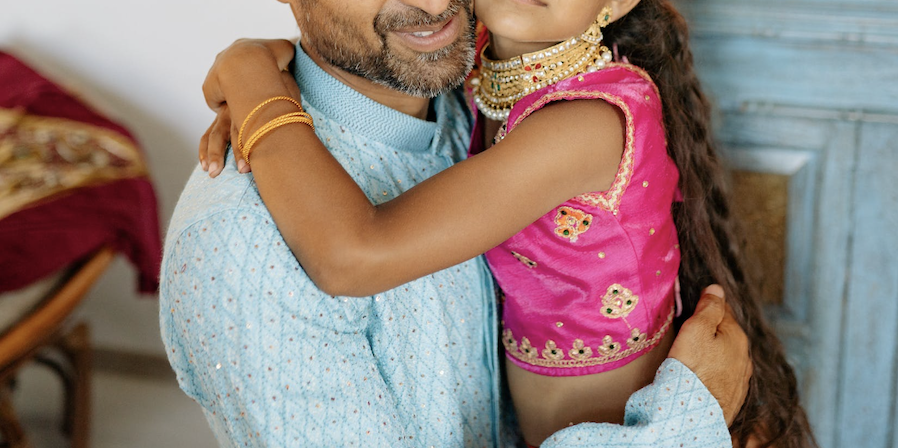
by Abbas Ali Bohari This is a heartfelt poem about a Bohra father’s greatest regret. The poet, who hails from Indore, India, spent years praying for the birth of a child and was finally blessed with a daughter. A few years later, he found out that she had been subjected to khatna, or female genital cutting, behind his back. This is a poem about his grief for her, his regret, and his plea to the world to end the cutting of girls in the name of religion. एक पिता का अफ़सोस कई बरसों रहे दोनों बेकरार रहमान ने लगाया बेड़ा पार बुजुर्गों की दुआओं का भी असर गुड़िया रानी आयी हमारे घर रौशन कर दिया हमारा संसार लायी खुशियों की सौगात अपार अब ना करू किसी की दरकार मालिक बस तेरा ही शुक्रगुज़ार हँसते हँसाते गए बरस गुजर एक दिन ऐसा आया खूंखार मज़हब के नाम पर मचाया अंधेर मासूम के जिस्म को किया दागदार कसम ख़ुदा की मैं नही ख़तावार पीठ पीछे किया सारा अत्याचार कही नही मिली दींन में तफ़सीर हैरां हूं कब से शुरू हुआ ये फ़ितूर शरीयत का अंग बताते ज़ाहील ज़ोकर पर मुख़ालिफ़त करते इल्मी ज़ानकार मगरिबी तहज़ीब करे इंकार मशरीकी कौमे बैठी लाचार खत्म करो नाजायज़ विचार सज़ा पाये सारे जो है हक़दार *अब्बास* करे अफ़सोस बारबार बचा ना पाया अपना लख्तेज़िगर
Dear Maasi: Why it is that women who have gone through FGM/C continue to do it to their young ones?
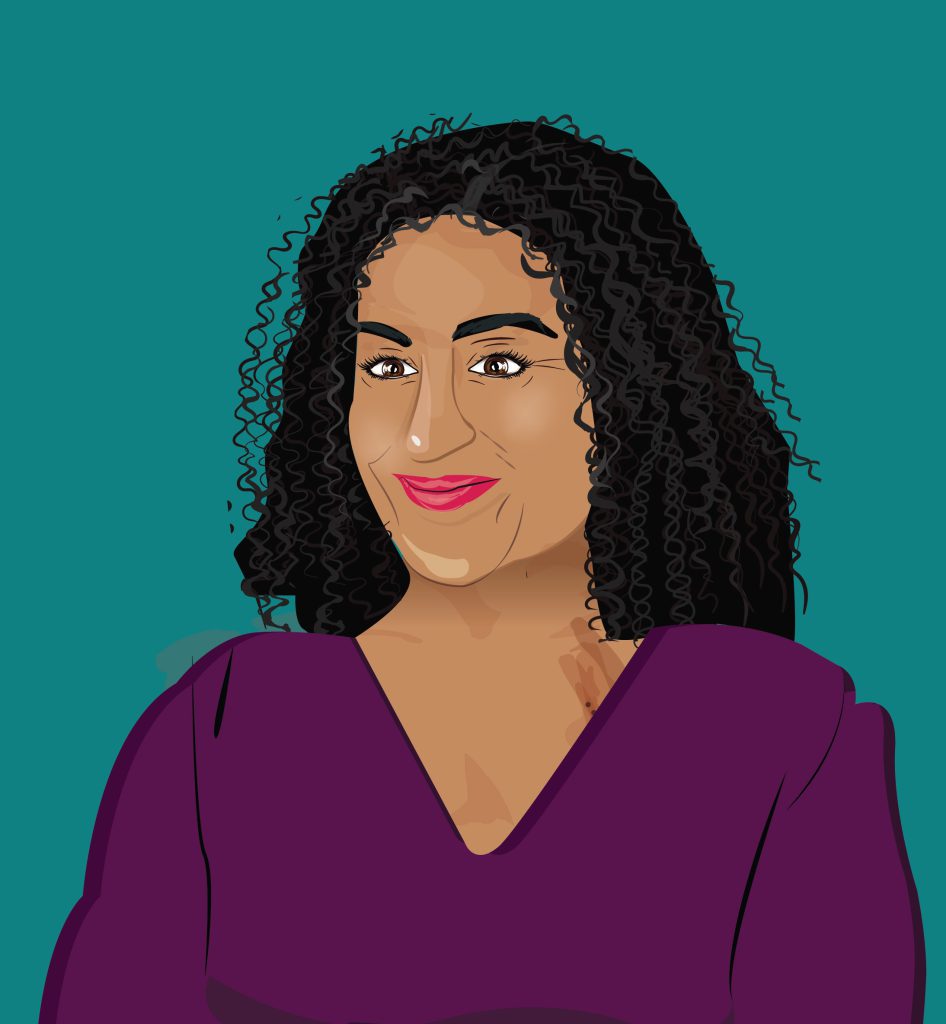
Dear Maasi is a column about everything you wanted to know about sex and relationships but were afraid to ask! It’s a partnership between Sahiyo and WeSpeakOut, and is for all of us who have questions about khatna (female genital mutilation/cutting or FGM/C) and how it impacts our bodies, minds, sexualities, and relationships. We welcome you to submit your anonymous questions. Dear Maasi, I am a man, and I have a few questions about FGM/C. I am wondering why it is that women who have gone through FGM/C continue to do it to their young ones? — Anonymous Dear Anonymous, Thank you for this question—it’s so important that men engage in these conversations too. It does sound counterintuitive that someone who has experienced FGM/C would wish to inflict it on their kids. But this issue is complex. The writer and activist Mona Eltahawy asserts that “women are the foot soldiers of the patriarchy.” This means that while the men hold the power and make the rules, women are required to enforce them, consciously and unconsciously. Women often participate in patriarchy to remain safely within the bounds of community expectations and to resist the risk of being ostracized or outcast. Leyla Hussein, a survivor, activist, and psychotherapist, challenges people to think about the ways that men quietly but directly support the practice, financially and morally. Maybe it’s not all on the women? I also think that to perpetuate FGM/C, the survivor must believe that FGM/C doesn’t cause harm. This belief is maintained by: Not being able or willing to challenge or disobey religious/cultural leaders who spread myths that FGM/C is required, harmless, or beneficial. The secretive, taboo nature of this social norm means that it’s hard to talk about it, let alone question its harm. A lack of sexual education. This results in poor knowledge about sexual pleasure and function. It also helps to maintain toxic and patriarchal notions about sexuality and gender norms. The traumatic and gaslighting nature of FGM/C may result in survivors doubting their own experience and/or not remembering some or all the details. Another aspect of the trauma is that some survivors might not want to question FGM/C’s psychosexual harms, because it means facing a Pandora’s box they are not ready to open. Instead, they may steadfastly refuse to acknowledge the harm and opt to stay in denial of both their own and others’ pain. Silence maintains the status quo. Thankfully, we’re getting louder! Sahiyo, WeSpeakOut, and other survivor-led groups raise awareness and create spaces for storytelling and dialogue. And there is a group for male allies who would like to help end FGM/C – Bhaiyo – which I hope you’ll tell your friends about. Anonymous, I hope that clears up some of your confusion. Stay tuned for answers to your other questions, which I’ll get to in the coming months. And as always, remember that sexual pleasure is our birthright! —Maasi About Maasi, aka Farzana Doctor:Farzana is a novelist and psychotherapist in private practice. She’s a founding member of WeSpeakOut and the End FGM/C Canada Network. She loves talking about relationships and sexuality! Find out more about her at http://www.farzanadoctor.com Disclaimer:While Farzana is full of good advice, this column won’t address everyone’s individual concerns and should not be used as a substitute for professional medical or psychological care.
Volunteer Spotlight: Events & Programs Intern Derrick Simiyu

Derrick Simiyu is a programs, monitoring and evaluation professional and passionate about upholding women’s rights and gender equality which drove him to volunteering in a community based organisation that supports girls in areas of Sexual Reproductive Health Rights (SRHR) and Menstrual Hygiene Management (MHM). What was your experience of learning about female genital cutting (FGC) for the first time like? The first time I heard about FGC was after high school. This came about as a result of networking with an activist against the extensive FGC in Kenya. I learned through this experience how dangerous FGC is and how activism is necessary to stop this damaging practice. When and how did you first get involved with Sahiyo? I first heard about Sahiyo in 2022. This was during my volunteership period in a community-based organization that champions for the rights of girls and young women. I realized that Sahiyo has the same values as the organization and so after seeing the opportunity for an internship, I immediately applied. I got an interview opportunity and that is how I first got involved with Sahiyo. What does your work with Sahiyo involve? I currently work in Sahiyo as an events and programs intern. My work at Sahiyo involves researching new topics for webinars, planning webinar agendas, attending virtual events from other organizations, and writing reflections about webinars for Sahiyo’s blog. How has your involvement with Sahiyo impacted your life? When I first heard about FGC, I thought it was just a light matter that only affected women from marginalized communities in Kenya. My mindset changed when I got involved with Sahiyo because I realized that FGC was not only an African issue but a global issue that affects more than 92 countries in the world. Sahiyo has made me more mindful and careful with my words, especially toward survivors and practicing communities. I am more mindful of using cutting rather than mutilation because I now know the psychological effects that come with the word mutilation on the practicing communities and the survivors of FGC. What words of wisdom would you like to share with others who may be interested in supporting Sahiyo and the movement against FGC? FGC has an impact on men as well as women in society. Men are indirectly affected when their daughters, spouses, or girlfriends have had FGC even though they are not directly afflicted in the same way that women are. This is why it is important for all men to join the fight against FGC. Through Bhaiyo, Sahiyo has the structures in place for that. It is plain and simple: anyone can get involved in this movement and use their skills to combat FGC.
Session on FGM at the workshop Nayi Dishayein- Rethinking Development
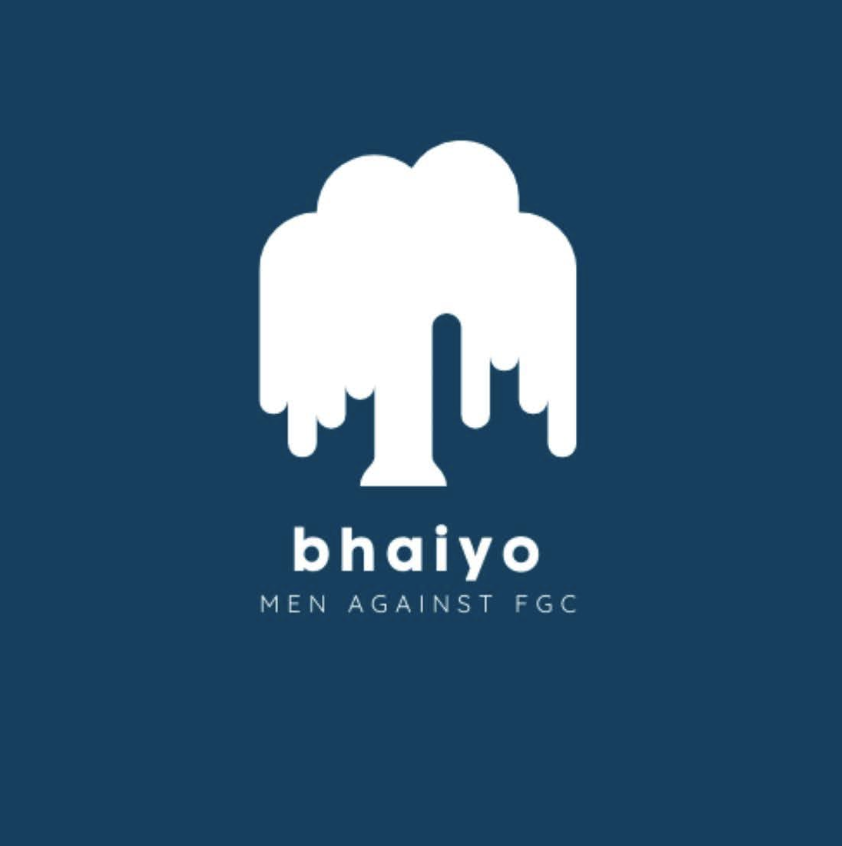
By Mohammad Chappalwala Gender-based violence takes many forms. One of the most extreme, I think, is female genital cutting/mutilation (FGM/C), which causes harm to the youngest and most vulnerable members of our society. Being a male member of a community that practices this, I believe it is my responsibility to spread awareness regarding this harm that is often done to seek control of the sexuality of women. On 26th December, 2022, Sambhaavnaa Institute of Public Policy and Politics incorporated FGM/C into its Nayi Dishayein workshop, a 12-day course educating youth from across India on a wide range of issues, from development and the confines of patriarchy to environmental conservation and sustainable living. We, along with our participants, challenged our beliefs, views, convictions, and privilege resulting from the enduring power structures that stem from the social markers of caste, gender, religion, and class; and how they are linked with the notion(s) of development. We began with a brief introduction to the practice of FGM/C, and discussed the different types practiced within different communities around the world. We looked at this form of gender-based violence through the lens of patriarchy, and examined how patriarchy enables gender violence, controls the sexuality of women and other genders, and expects conformity. After this, we issued a trigger warning and screened the movie, A Pinch of Skin for our participants. The film was followed by a short presentation detailing the practice of FGM/C and its categorization as a human rights violation by the World Health Organization. I find the fact that male members of my community are either unaware of FGM/C, or choose to stay away from the cutting of their loved ones, to be deeply unsettling. My community is the Dawoodi Bohra community, where this practice is exercised discreetly – nobody talks about it. Usually, the mother and grandmother of the child decide to take her to a local practitioner, who gets the job done. Often these practitioners are not even medically trained. In 2019, my team and I had the opportunity to attend Sahiyo’s FGM/C retreat and learn from Dr. Sheroo Zamindar, an obstetrician-gynecologist from Ahmedabad. With this knowledge base and our own learning, we were able to educate participants of this recent session on FGM/C, which is what we believe to be a crucial part of any discussion chronicling gender-based violence. This February 6th, International Day of Zero Tolerance for FGM/C, we, as male allies, must wholeheartedly commit to becoming pioneers in the conversation to end this practice and protect those we love. Mohammad Chappalwala is an autodidact environmentalist who left his corporate job and the hustle of the city to live in the mountains and work for the community. He is passionate about contributing to social movements that deal with the fundamental rights of the people, and strongly believes in the work of Sahiyo; he likes to provide complete support to stop FGM/C as a Bhaiyo, or male ally. He is a programs convener at Sambhaavnaa Institute of Public Policy and Politics, Himachal Pradesh.
The impact of Bhaiyo: How male allies work to end female genital cutting
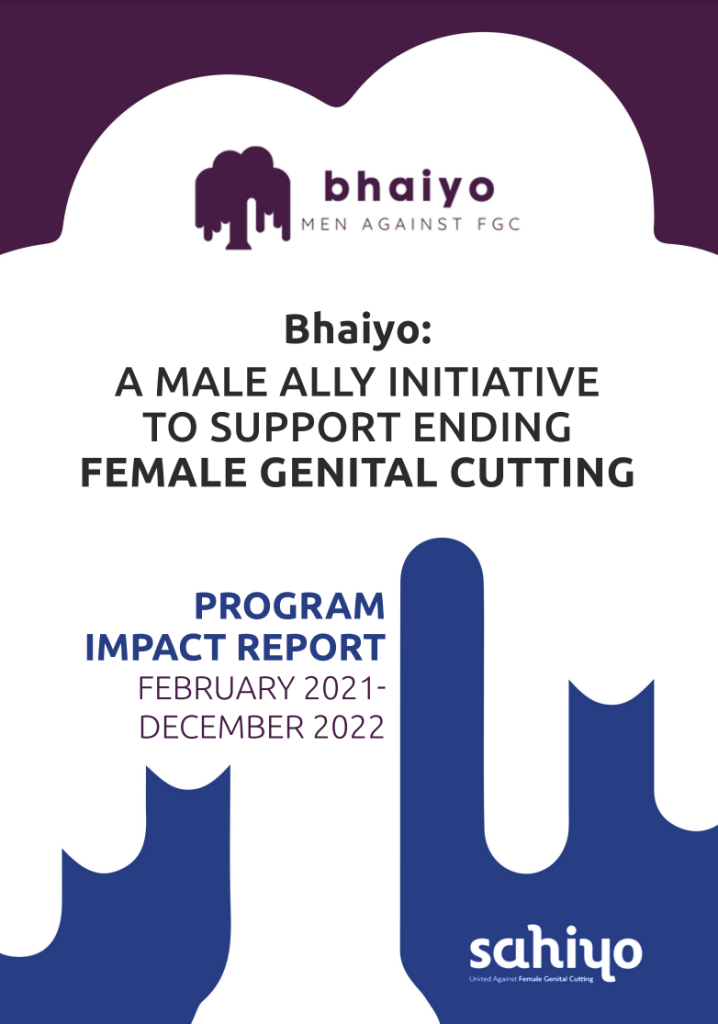
Today, on International Day of Zero Tolerance for Female Genital Mutilation/Cutting, Sahiyo is proud to release our program impact report, Bhaiyo: A Male Ally Initiative to Support Ending Female Genital Cutting. The report spans the duration of our Bhaiyo program, from its creation in February 2021 through December 2022, and covers our challenges, lessons learned, and future paths for growth. Bhaiyo, meaning ‘male friends’ or ‘brothers’ in Bohra Gujarati, was launched to create a space where male allies can collaborate, spark dialogue, and spread information about the harms of female genital cutting (FGC). In particular, Bhaiyo participants work by engaging communities at the grassroots level to address and build awareness of the harmful nature of this practice and its consequences on their loved ones and the community in general. Since the program’s launch: 15 men joined the Bhaiyo program 13,247 people engaged with our public awareness campaigns 36 people participated in our public awareness campaigns 176 people attended Bhaiyo male-engagement webinars 28 blog posts written to uplift the voices of male activists 81.3% of members have joined additional programming efforts after joining Bhaiyo February 6th is a day for activists, advocates, and stakeholders to come together, raise awareness, and advocate for the end of FGC. Today, and for the rest of the month of February, we’re uplifting the work of Bhaiyo because we’re proud of the program’s accomplishments. We hope you’ll take the time to learn more about how we’ve been engaging men in the work to support survivors and prevent FGC for future generations. “Bhaiyo allows men to have open and honest conversations about a topic they may or may not know but should be important to them. As brothers, it’s our collective responsibility to leave the world safer than we found it for those that we love. Bhaiyo aims to raise awareness to help advocates and survivors working to end FGC today.” ~ Murtaza Kapasi We also have an upcoming Bhaiyo event that is open to the public! Date: Thursday, February 23rd Time: 9:00 am EST (New York) / 7:30 pm IST (India) Who: Current Bhaiyo members & Prospective Bhaiyo members (anyone interested in supporting male engagement on the topic of ending FGC) Register: bit.ly/BhaiyoCommMeeting To join our Bhaiyo program, please fill out this application form.
Bhaiyo Mohammad Chappalwala to be awarded Donald A. Strong Man of The Year Award

On October 14th, Mohammad Chappalwala, a Bhaiyo (male ally), will be virtually presented with the Donald A. Strong Man of The Year award by the Global Woman P.E.A.C.E. Foundation. Mr. Chappalwala, who is based in India, will be unable to accept his award in-person, but is deeply humbled by the gesture; to put it in his own words, Mohammad believes he has “just started this journey of speaking out against the practice.” All of us at Sahiyo are proud to support the work of community members such as Mohammad, and are hopeful about further collaboration across our Bhaiyo program. Congratulations! To learn more about his contribution as a Bhaiyo, read this story on advising a concerned father how to navigate his daughters’ risk of undergoing FGC.
Conversation with a Bhaiyo: Advising a concerned father

By Urvashi Sharma I recently spoke with Mohammad Chappalwala about being a Bhaiyo, or male ally, and some of his experiences. It was a great opportunity to learn more about Mohammad’s story, and the work he has done towards ending FGC. This story is just one example of the necessity for men to stand up and speak out, to help support the ending of this harmful practice from continuing. Mohammad and Mr. N were initially connected through Sahiyo, as Mr. N was concerned about undergoing a separation from his wife and the potential implications of his young daughters being cut: “He has two daughters, now probably aged six and eight.” Looking for a fellow father to speak with on this issue, Mr. N was introduced to Mohammad via Whatsapp, and a conversation on mutual interests ensued. Mohammad was pleasantly surprised by the fact that “he really was quite open about specific details in his life…because he was very invested in FGC not happening to his daughters.” Soon, Mohammad was able to provide advice on the matter: “I started with small suggestions of ways in which he could approach the issue based on what I had learnt from the [Sahiyo Activists] Retreat, talking with Aarefa etc., and we decided that he would speak with his wife first and convince her not to give in to what her parents wanted to be done to the daughters. I suggested this because in my experience, most elderly members (age 60+) of the community are very rigid in their thinking and are difficult to convince.” Mr. N had never spoken with his wife about their daughters undergoing FGC, and wanted to include Mohammad in the effort to convince his wife that his daughters should not be cut. “In the end I talked to his wife and she said that she was also against FGC and that she would not let it happen to her children regardless of the stance of her relatives.” Afterwards, Mohammad was able to share this good news with Mr. N. “I went back… and told him that his wife was mostly sorted and that he shouldn’t worry that much anymore.” The two men stay in touch on and off, and this interaction led Mohammad to “ think of more complicated cases and how we reach those people. How do we tell them that we exist?” Ultimately, we agreed that storytelling itself is powerful in that if you hear about something that has happened to you from a person to whom it has also happened, you will find greater comfort in that. Through the work that we do at Sahiyo of sharing stories and connecting survivors and allies, there is an emphasis on making sure that everyone feels equally heard and represented. As another member from Bhaiyo Murtaza Kapasi has said: “Bhaiyo allows men to have open and honest conversations about topics they may or may not know should be important to them. As brothers, it’s our collective responsibility to leave the world safer than we found it for those that we love. Bhaiyo aims to raise awareness to help advocates and survivors working to end FGC today.” Sahiyo’s Editorial Team aims to make the storytelling process more accessible. Zoom Interviews are an option for anyone who is uninterested in the writing experience, but still looking to share their story. Please contact editor@sahiyo.com for more information.
Each One, Reach Bhaiyo
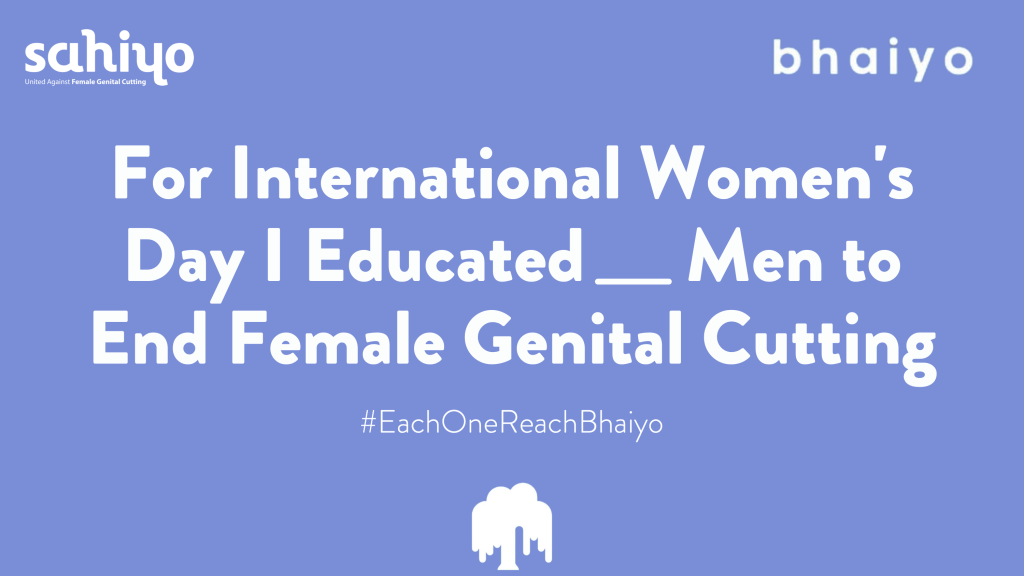
In honor of International Women’s Day on March 8th, Sahiyo will officially launch our new campaign “Each One, Reach Bhaiyo”. During this campaign, Sahiyo will encourage staff, volunteers, and community members to reach out to and educate at least one male-identifying person in their life about female genital cutting (FGC) and encourage them to join the Bhaiyo program. Through this campaign we hope to involve men in the important work of protecting women and girls. We know that just one conversation can spark a global change towards preventing the human rights violation that is FGC amongst future generations. This International Women’s Day, and throughout women’s history month, let’s stand up for women and girls. Leading up to the campaign, we will be sharing materials to educate and guide people on having effective conversations with men about FGC. If you are struggling to start a conversation with the men in your life about this topic, be on the lookout for our materials in the coming weeks. How to Participate: To participate in our campaign, share or post a picture of yourself with a placard saying that you have reached out to someone with the hashtag #EachOneReachBhaiyo. Our Programs Coordinator, Catherine, has done an example below: You can download the template here. We have also drafted a list of questions if people wish to respond to them in blogs or in their submissions! Why did you want to reach out to another man in your life to discuss FGM/C? What was his reaction? Was he aware of FGM/C? What advice would you give to others trying to reach out to the men in their lives? We will begin posting these submissions in March to help raise awareness about the need for crucial conversations with men about this issue. Each one, Reach Bhaiyo! Please send your submissions to programscoordinator@sahiyo.com or text them on Whatsapp to +1 202 754 2563
Bhaiyo Spotlight: Honoring Donald Strong
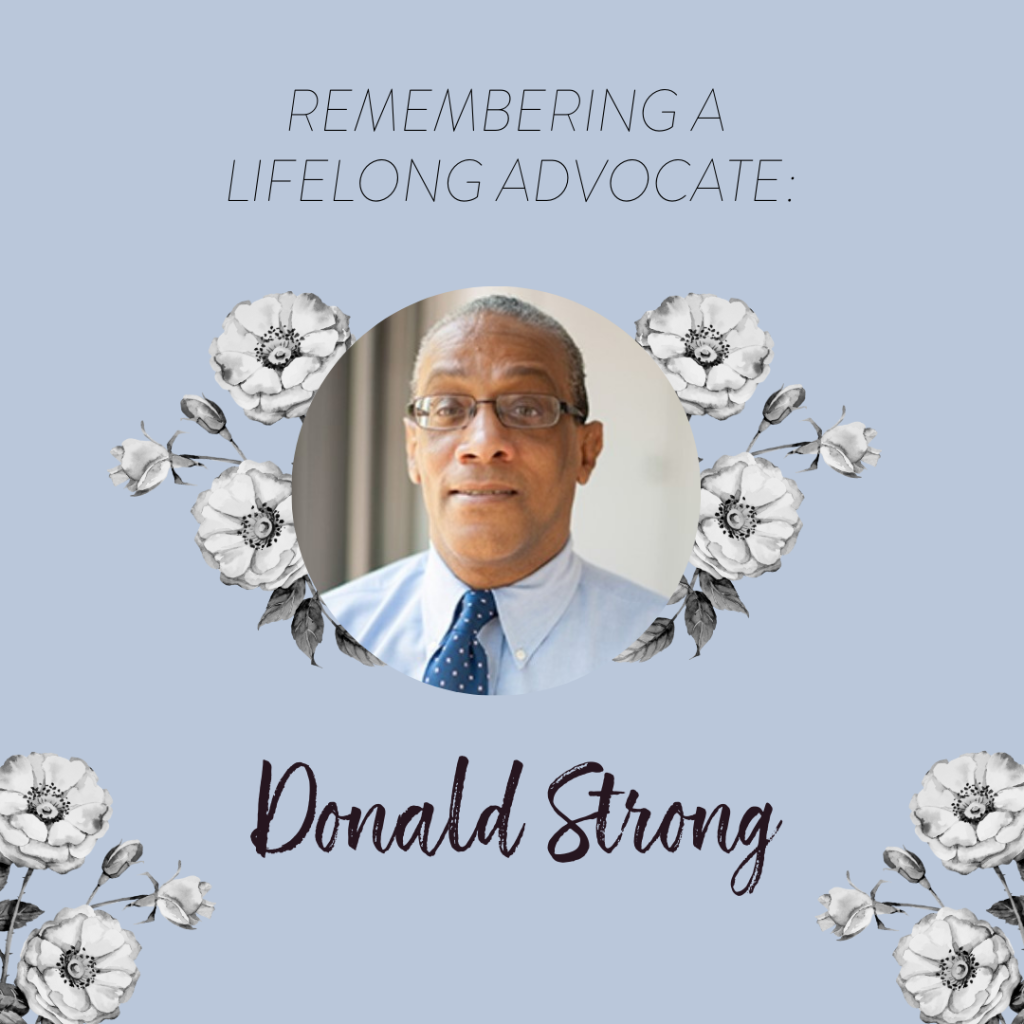
Sahiyo was saddened to hear of the recent passing of Donald Strong, a true male ally in the work to end female genital mutilation/cutting (FGM/C), whose advocacy provided energy towards propelling the Stop FGM Act of 2020 into law. As Director of Research Coordination and a Practicum Director in the Department of Prevention and Community Health with George Washington University, Mr. Strong worked closely with nonprofit organizations, health departments, and healthcare providers serving the African immigrant community in the DMV, in the work to eliminate the practice of FGM/C. Some of us at Sahiyo were lucky enough to work with him directly on this effort; co-founder Mariya Taher collaborated with Don on the GW Dean’s Seminar Series: Addressing Female Genital Mutilation and Cutting (FGM/C) in the DMV. Sahiyo U.S. Advisory Board Member Maryum Saifee recognizes Don as someone who “really laid the groundwork for GW’s role in becoming a leader in the anti FGM/C advocacy efforts in the United States.” Sahiyo would like to commemorate him through a spotlight with our Bhaiyo initiative (something Don was really excited about), which aims to create a space where male allies can come together to collaborate, spark dialogue, and spread information about this form of gender-based violence and it’s harmful impacts. There is perhaps no one better to commemorate Don than those who knew him best. We’ve asked some of his colleagues, and those who were lucky enough to know him personally, to provide reflections on his legacy. Don Strong, a connector, a cheerleader, a community activist, and confidant. When he walked into any meeting, within five minutes, he made sure everyone knew one another and how we were all connected. I remember we were giving a presentation at the UN about FGM/C, and the storytelling we were engaging in was getting emotionally heavy. Don, sensing the tension, stood up and started engaging with the room. The participants didn’t know one another when they entered the room, but Don was connecting people, connecting lives, and within minutes had the entire room, standing up and sharing their stories. By the end of the session Don had us all exchanging contact information and taking group photos. He was incredibly humble and wouldn’t let us tell people that it was his advocacy, his storytelling that put the Stop FGM ACT of 2020 into action. As one of our community partners stated “It was easy to see that Don was an advocate to his core. His motivation to end FGM/C, and to get men involved in the process, was inspiring and contagious. I know he will be dearly missed by GW, the field, and most of all his family.” Don, my friend, I’m going to miss you. May you rest in peace and may your power be instilled in each of us to continue your mission. -Karen A. McDonnell Don was a colleague, a friend, and an advocate against FGM/C. He worked quietly in support of organizations in the nonprofit community. Don was partly responsible for the relationship GWPF has with George Washington University today. He had called my office in search of information on FGM/C, and we ended up chatting for a while. At the end of our conversation, he invited me to meet with Dr. Karen McDonnell, Dr. Ghada Khan, and him. On a bitterly cold February morning in 2017, I met with Don, Karen, and Ghada for the first time. That meeting was the birth of the current relationship GWPF has with George Washington University. I admired the passion Don possessed for this work. He was passionate about young men becoming involved in the work against FGM/C. He will always be remembered, and most definitely missed. May his soul find rest and peace. -Angela Peabody I met Don a few years ago, and since that day he has inspired me everyday with his immense passion and dedication to ending FGM/C. His ability to foster connections was simply unparalleled. His energy and charisma would light up every room he walked into and liven every conversation he had. Anyone who met him could immediately tell that he was such a radiant and incredible human being. He always cheered me on and I will be forever thankful for his friendship and mentorship through the years. Along with our GW community, and his friends and family, I will miss him so much. But, his legacy will live on. Rest in power, Don. -Krishna Patel I first met Don in 2015 when he and his colleague, Karen McDonnell, were thinking through the process of building a strategy to counter Female Genital Mutilation (FGM) in the US. I remember sharing both my personal story as a survivor, but also my experiences as a policymaker trying to move the needle on addressing the issue globally. I told him how important it was that we focus on FGM — filling the data and research gaps domestically— to have the credibility and moral authority to advocate for the same calls to action with counterparts overseas. I was struck by Don’s kindness during the meeting and over the many years, the strength of his conviction to keep pushing and elevating an issue that is frankly still taboo and squeamish for many to absorb. That took courage and his bravery has made a difference in the lives of so many of us, both in the present moment and future generations, carrying his legacy forward. I am forever grateful to have been blessed with the opportunity to partner and learn from such a powerful advocate for human rights and gender equity. -Maryum Saifee
Bhaiyo engages male allies to empower communities to end female genital cutting during June campaign

Launched in 2020, Bhaiyo is Sahiyo’s male allyship program whose aim is to create a space where male allies can come together to collaborate, spark dialogue, and spread information about female genital cutting (FGC) and its harmful impacts. Bhaiyo has been involved in engaging male allies in a multitude of ways, including a webinar on male allyship earlier this year. On June 20th Bhaiyo will begin a Father’s Day inspired social media campaign to promote our program and encourage male allyship in our work to empower communities to end FGC. During this month-long Father’s Day social media campaign, we will be highlighting the role men play in empowering their communities to end FGC — particularly focused on their roles and experiences as fathers, or future fathers, and brothers. This project is open to all male-identifying individuals who feel they can speak on this issue. We are asking anyone who feels passionate about this issue to send in a short response answering the questions below in video, audio, or photo format. You can also send in a quotation if you are not comfortable with sharing a video or photo. Additionally, we can keep your response anonymous if you wish. Here are the questions we are hoping you can answer. You can answer one, multiple, or all of these questions: When did you first come to know about FGC? Why are Bhaiyo and male ally programs in general important? How can brothers/fathers make an impact? What message would you like to give to all the fathers out there? Please email your video to programscoordinator@sahiyo.com by June 15th if you wish to participate in our program. This month-long social media campaign will culminate in a meet and greet event for male activists involved in this work. On July 20th male activists and members of Bhaiyo will have the opportunity to meet with one another, talk about their experiences, and discuss their hopes for Bhaiyo. By culminating this campaign in a meet and greet event, we hope to inspire community and bonding between our male allies so that they can share resources, stories, and keep each other motivated in their crucial work. By using social media to share the stories of male allies, we hope to show other men who have not yet become involved in Sahiyo’s work that there is a spot for them and that their voices are crucial in ending FGC. Additionally, we hope to elevate the voices of our amazing male allies who are already engaged in this work so that they can spread their messages of hope and transformation to a larger audience. We hope that this campaign will help to break the silence that keeps men from speaking up against FGC and begin to normalize conversations around what men can be doing in their communities to help encourage the end of FGC.
